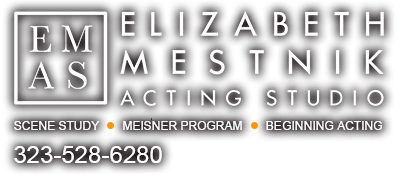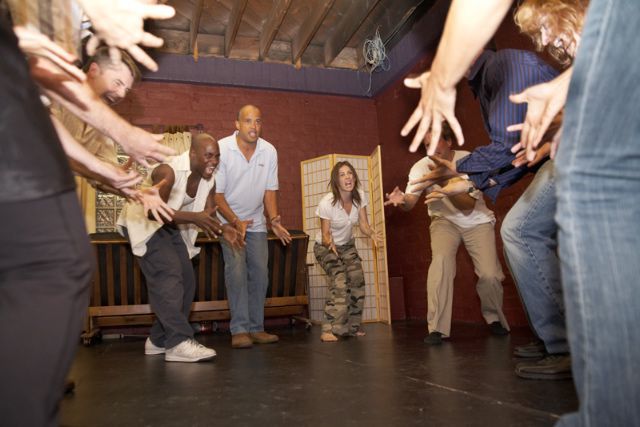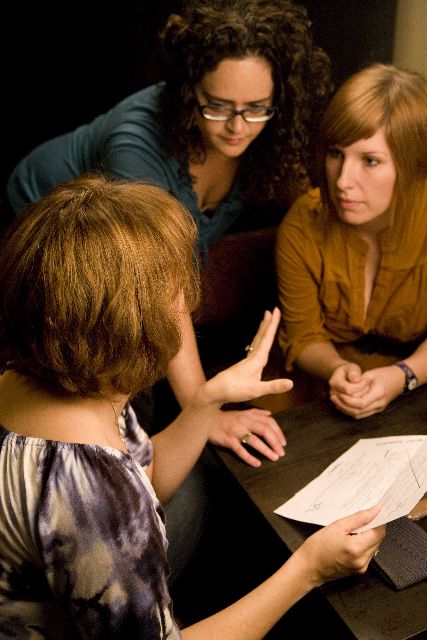“To Behave Truthfully under Imaginary Circumstances” – Sanford Meisner’s 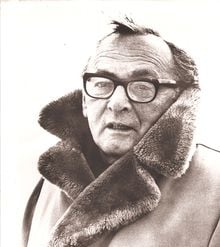 definition of acting.
definition of acting.
The Independent Activity is the next step after the basic repetition exercise. It is the phase of the work that really brings home what it means to “behave truthfully”. In this phase of the work a student is asked to do a physically difficult task, something that takes 110% of their concentration to achieve. This is a surprise to actors who in the past have only “pretended” on stage before – “pretended” to read a letter, or “pretended” make lunch. Here any activity they do they have to REALLY do it. To help their concentration we give the activity certain guidelines, which we introduce one at a time:
- A standard of perfection that lets us know if we are succeeding with the activity. For example, it’s not enough to build a house of cards, the student must get more specific, ie: build a 3-story house using all 52 cards.
- A simple and specific reason for needing to do the activity.
- Urgency: which means they know how much time they need to get this activity done; no more and no less.
An activity that does not integrate all of these criteria is not acceptable, and the student starts to learn how to hold themselves to high standards. Any holes in the crafting will keep the improvisation that is to come from fully developing. It will hurt their acting.
Skills learned through The Independent Activity:
- It grounds the student in the reality of doing. Nothing we do in these first steps is pretend. What that means is that they learn how to really do something under imaginary circumstances. If they choose to paint a picture, they really paint, and really give themselves a standard of perfection to help them know if they are succeeding or failing.
- It reveals that emotion is a by-product of DOING. The more they REALLY do the activity, and the more they struggle with it, the more likely REAL emotional life will start to emerge (usually frustration).
- It teaches that the more specific the actor is in his or her crafting, the easier it is to believe in the imaginary circumstances.
- It begins the exploration of what makes the actor tick, what pushes each individual actor’s emotional buttons. As we start to make the reasons for doing the activity have greater importance (what we call raising the stakes) the actor is forced to craft from personal feelings – what makes them angry, or scared, or exhilarated.
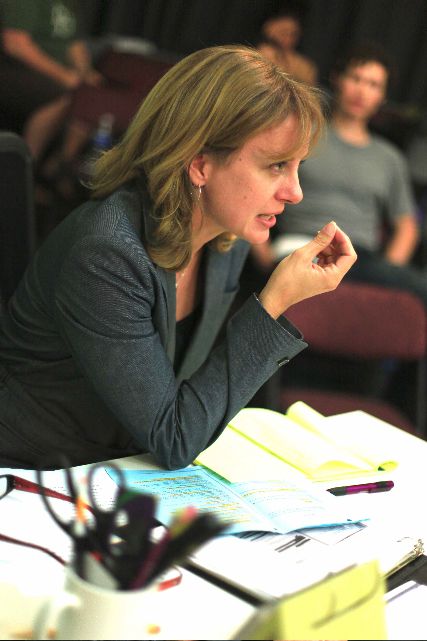 While this actor is working on their independent activity, their partner will start the repetition exercise – and we learn that acting means you must DO and you must also work off of your partner – and neither can be sacrificed. It’s very difficult to do. The actor with the independent activity will want to tune their partner out in order to work on their activity, or they will stop working on their activity in order to work off of their partner – and yet they cannot do this – they must do both. This creates an innate push and pull for the actor “I need to get this activity done, but this other person is demanding my attention and keeping me from succeeding”. It ultimately will create a conflict between the partners. Believe it or not – these exercises were developed to create conflict because acting is full of dramatic fights. As an actor we must embrace conflict in a scene. In the real world many of us avoid conflict at all costs, but as actors we have to be comfortable living in the drama. The Independent Activity also teaches the actor to:
While this actor is working on their independent activity, their partner will start the repetition exercise – and we learn that acting means you must DO and you must also work off of your partner – and neither can be sacrificed. It’s very difficult to do. The actor with the independent activity will want to tune their partner out in order to work on their activity, or they will stop working on their activity in order to work off of their partner – and yet they cannot do this – they must do both. This creates an innate push and pull for the actor “I need to get this activity done, but this other person is demanding my attention and keeping me from succeeding”. It ultimately will create a conflict between the partners. Believe it or not – these exercises were developed to create conflict because acting is full of dramatic fights. As an actor we must embrace conflict in a scene. In the real world many of us avoid conflict at all costs, but as actors we have to be comfortable living in the drama. The Independent Activity also teaches the actor to:
- Stand up for themselves and find their voice
- Work from a place of sensitivity and compassion
- Craft from what has real meaning for them but not from real life. Acting is always imaginary and if we use real life drama that is not acting, and not a healthy way to work
Emotional Preparation comes next – and that is the very personal technique that we use to get to a heightened emotional state, on our own, without the assistance of an activity or a partner. It is self-induced emotional life. It’s not our favorite way to connect emotionally but it’s important to be able to do this when the actor has to start a scene already fully alive. This happens all the time in film shoots where filming may pick up over and over again in the middle of a scene. We do this work so that the actor develops an entire repertoire of emotions to bring to the imaginary circumstances. The week–in, week-out emotional workout also helps our emotional life to be easily called up at a moments notice. We can create any emotional life that the character might demand.
The Domestic Exercise comes next – this is when the students start to create different relationships with their partners. We make sure that the actor doesn’t lose their moment-to-moment connection for the sake of a full emotional life. Emotion is seductive when it first starts to come up, it feels good to feel! But an audience doesn’t want to sit there watching someone emote. They want to see what the character does THROUGH the emotion. The actor has to be reminded that acting is not emotion but that the emotion will inform how the actor DOES something. Emotion without doing is not acting.
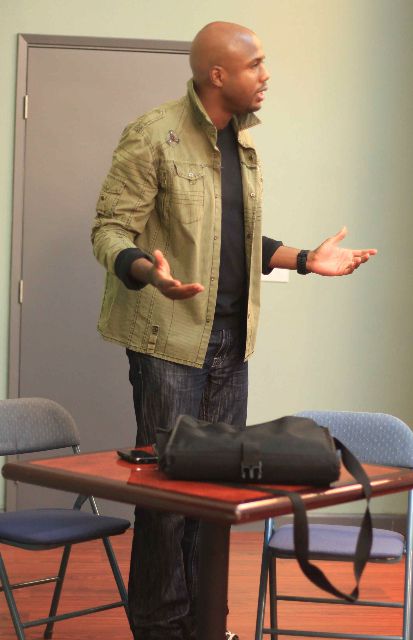 Finally, we introduce the Shared Circumstances. With this work, actors start to think like actors, learning how to ask the right questions and flesh out the scenes. They get more specific about their relationships, and strengthen their points of view. They start to work on objectives from an organic approach rather than in intellectual one. This is when each actor’s uniqueness really starts to shine. All the while the student must NEVER lose the essential idea that everything you do is in RESPONSE to your partner, moment to moment. It’s what we developed through the repetition exercises, and just because we’ve moved on to other steps – we can never lose that foundation. Day in and day out, in these improvisational scenes that are built from the repetition exercise, the actors get to:
Finally, we introduce the Shared Circumstances. With this work, actors start to think like actors, learning how to ask the right questions and flesh out the scenes. They get more specific about their relationships, and strengthen their points of view. They start to work on objectives from an organic approach rather than in intellectual one. This is when each actor’s uniqueness really starts to shine. All the while the student must NEVER lose the essential idea that everything you do is in RESPONSE to your partner, moment to moment. It’s what we developed through the repetition exercises, and just because we’ve moved on to other steps – we can never lose that foundation. Day in and day out, in these improvisational scenes that are built from the repetition exercise, the actors get to:
- Expand their emotional lives.
- Exercise their imaginations.
- Hone their crafting.
- Find their unique voice.
It’s an intense and challenging program, but those who dedicate themselves to this work will never be the same, as actors, as artists or as people.
Stay tuned – our next discussion will be about how Scene Work is integrated into the first year of Meisner Technique.
Article written by Elizabeth Mestnik

